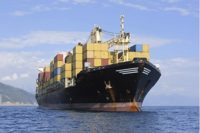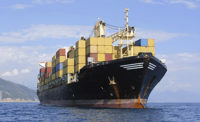Toyota Motor North America, Inc. (TMNA), Plano, Texas, revealed Project Portal, a hydrogen fuel cell system designed for heavy duty truck use at the Port of Los Angeles. This zero emission truck proof of concept will take part in a feasibility study examining the potential of fuel cell technology in heavy duty applications. The study will begin this summer and contribute to the Port’s Clean Air Action Plan, designed to reduce harmful emissions from operations at the Ports of Long Beach and Los Angeles.
“As they did with the Prius and the Mirai, Toyota is taking a leap into the future of technology. By bringing this heavy duty, zero emission hydrogen fuel cell proof-of-concept truck to the port, Toyota has planted a flag that we hope many others will follow,” says Mary Nichols, chair, California Air Resources Board (CARB), Sacramento, Calif. “CARB will be following the progress of this feasibility study with interest, as we look to develop the best mix of regulations and incentives to rapidly expand the market for the cleanest, most efficient big trucks to meet the need for dramatic change in the freight sector.”
Project Portal is the next step in Toyota’s effort to broaden the application of zero emission fuel cell technology that can serve a range of industries. It is a fully functioning heavy duty truck with the power and torque capacity to conduct port drayage operations while emitting nothing but water vapor.
“Toyota believes that hydrogen fuel cell technology has tremendous potential to become the powertrain of the future,” says Bob Carter, TMNA executive vice president. “From creating one of the world’s first mass market fuel cell vehicles to introducing fuel cell buses in Japan, Toyota is a leader in expanding the use of versatile and scalable zero emission technology. With Project Portal, we’re proud to help explore the societal benefits of a true zero emission heavy-duty truck platform.”
The Project Portal platform is designed to provide the target performance required to support port drayage operations. The truck generates more than 670 horsepower and 1325-pound-feet of torque from two Mirai fuel cell stacks and a 12kWh battery. The concept’s gross combined weight capacity is 80,000 pounds, and its estimated driving range is more than 200 miles per fill, under normal drayage operation.
“The Port of Los Angeles is excited to collaborate with Toyota to explore the feasibility of fuel cell technology for port drayage operations,” says Tony Gioiello, deputy executive director of port development, Port of Los Angeles. “Our port and industry stakeholders have demonstrated their leadership in reducing pollution from port-related operations, and we see the potential of Toyota's zero emission heavy-duty truck technology as another solution to meet the long-term goals of the San Pedro Bay Ports Clean Air Action Plan.”
Toyota opens portal for zero emission trucking at Ports of Long Beach, Los Angeles
Project Portal is the next step in Toyota’s effort to broaden the application of zero emission fuel cell technology that can serve a range of industries.


